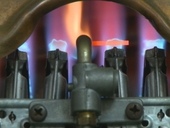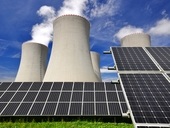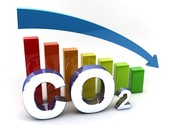The paper presents the derivation of calculating the real efficiency of gas boilers with single-stage atmospheric burner. The cause of looping are states when the minimum boiler output is several times higher than the required nominal heat output for heating. The looping of boiler reduces its operating efficiency.
Archiv článků od 27.6.2013 do 3.2.2014
New rules for cost of heat energy allocation for central heating in houses applying evaluative indicators for these purposes. The Minister for Regional Development approved a draft amendment to Decree No. 372/2001. This amendment allows to increase the share folder of running radiators up to 70 % of total heat energy cost. The distribution of this component to final consumers suffers from a significant systemic problem, and these measures will further worsen the credibility of allocation results.
Plans of the coalition in energy sector:
- - Reduce energy intensity of industry
- - Diversification of energy resources
- - Reduce energy performance of buildings
- - Review the RES support
- - Support for the research of RES and energy storage
- - Construction of new units at Temelin Nuclear Power Plant
- - Reconstruction and greening of heating industry
- - Assure coal for heating
- - Revitalization after the coal mining
- - Support for Smart Grids
Opinions of the professionals concerned on the issue of fire safety in the operation of chimneys, flues and fuel appliances that address the Government Regulation No. 91/2010, are very different. Since this is a very serious issue, TZB-info wants to provide space for professional discussion, which result should be the unification of opinions.
The article is a commentary on Czech TV report about the feasibility of reducing CO2 in the atmosphere. To eliminate carbon dioxide from the atmosphere has been proposed a number of methods, many of which are currently at the stage of mere concept. Namely, this includes the artificial trees mentioned in the report. Even if such methods work, there still remains the question of what to do with the captured CO2. Storage in geological formations is uncertain and material recovery faces high energy demands. In some cases there is a misunderstanding resulting from the confusion of CO2 and other emissions. Namely on the facade, which allegedly eliminate CO2 from the air, but in fact it eliminates nitrogen oxides. The only reliable way to reduce CO2 emissions permanently is to reduce energy consumption.
Solar radiation can be utilised in two basic ways. You can either gain heat from solar thermal collectors or electricity in photovoltaic panels. So far, heating of water by photovoltaics was too expensive to compete with conventional solar thermal collectors.
Weight , durability , and currently even the price of solar thermal collectors is comparable with commercially available photovoltaic modules.
Annual energy yield per unit area is approximately twice in the solar thermal collectors compared to the highest quality photovoltaic modules with cells made of monocrystalline silicon, due to the higher efficiency.
In the summer the photovoltaic modules are better when the working fluid is heated to temperatures above 100 °C. In the winter the breaking point is about 40 °C. The advantage of photovoltaics is the absence of heat transfer fluid and easier transfer of energy produced to the point of use. Electricity can also be used more versatile than heat.
If the investment cost of a complete solution of heating water by electricity from photovoltaic panels, either directly or using a heat pump, is lower than the investment cost of the solar thermal system, the PV water heating can be considered as effective utilization of electricity from photovoltaic plants. Such a solution could then be included as an alternative to any grant support for solar water heating.
Extensive modification of TPG 704 01 - Gas consumption equipment and gas burning appliances in buildings - came into effect on 1 August 2013. Most changes are in the chapters that address the placement of gas appliances and air supply for combustion and ventilation and safety of gas appliances in version B. In this article will be mentioned and possibly commented on the most important changes.
The article deals with the influence of oil prices on the share price development of important international oil companies in the past decade, particularly in the years 2000 to 2010. Dependence between these two variables was medium strong in the previous period, regardless of dividend yields. Companies BP and PetroChina were exceptions partly, the article gave a justification for this difference. Shares of oil companies are an interesting component of the investment portfolio in the medium term due to declining oil reserves and the expected increasing of oil prices. However, in the long term we can expect increasingly replacing oil with other energy resource.
It is much more efficient to produce mechanical work by electrical engine "fuelled" by photovoltaic modules than produce the same amount of mechanical work by internal combustion engines running on fossil fuel or first-generation biofuel. The first choice could be much cheaper and produce order of magnitude more energy from agricultural land than biofuels. Therefore photovoltaics could hypothetically contribute significantly to the fulfillment of national and European target for the share of renewable energy sources (RES) in transportation.
The Chamber of Deputies approved the stopping of subsidies (feed-in-tariff) for renewable energy sources beginning January 1 2014. Support for combined heat and power generation from fossil fuels and support combustion of waste based on the same legislation remained unchanged.
By the opinion of the Chamber of RES the provisions of the law requiring a proof of beneficiaries structure is insufficient "especially because it does not apply to owners up to 10% of the shares and efficiency is only proposed from 1 July 2014, which gives a disproportionately large space to conceal the ownership structure."
In the U.S., in recent years due to the strong expansion of shale gas, surpluses of raw materials (such as coal), which knocked the price down sharply all around the World. On the contrary, the Russian oil giant Gazprom stops surveys of new deposits and new not open. Gazprom got the defensive in the pricing issues. In many European countries are long-term contracts clause of payments substantially changed. Questions and political strategy based on the Kremlin “Gas diplomacy” has received by the American unconventional extraction palpable hit. Gazprom and the Kremlin has weakened its position in the EU. The following text attempts to identify the main causes and consequences of major changes in the global gas market.
Recently broad media in the Czech Republic coverage on hazards from PV systems to fire fighters. Similar situation was in Germany two years ago. That is why Fraunhofer-Institut für Solare Energiesysteme ISE together with TÜV Rheinland and other partners implemented a research project „Assessment of fire risks in PV systems and development of safety concepts for risk mitigation“. The project concluded that the fire risk of PV system is much less than it is publicly alleged in Germany.
There is a small risk that fires can be started by PV components. This risk can be reduced by careful installation, initial verification i.e. inspection and testing, periodic verifications, (yield) monitoring to detect degradation problems, and verification of test procedures and maintenance requirements for conventional AC- components. Overall conclusion is that PV systems are not maintenance free.
Whole presentation from EU PVSEC (in English).
The potential of microalgae as a source of renewable energy received lately large attention. Microalgal biomass is a potential source of renewable energy and it can be converted into energies such as biodiesel, ethanol, combustible gasses or it can be used to produce pharmaceutical, food additives and other. If microalgal biofuel production is to be sustainable and economically acceptable, further optimization of microalgae production and its conversion to viable compounds is needed. Microalgae are photosynthetic microorganisms with simple growing requirements (light, sugars, CO2, nitrogen, phosphorus, and potassium) that can fixate CO2, produce lipids, proteins and carbohydrates in very short periods of time.
These products can be processed into both biofuels and valuable co-products. Municipal, agricultural and industrial wastewaters are able to satisfy growing requirements of microalgae and hence provide cost-effective sustainable biofuel production with simultaneous wastewater treatment. Integration of biofuel production and wastewater treatment has major advantages for both industries, however major challenges needs to be overcome in order to implement such facilities in large-scale. This paper reviews current status of this topic with focus on fuel production with simultaneous algae wastewater treatment and major technological challenges.
The emissions trading scheme, EU's flagship climate policy tool, is at a turning point. With the price of carbon hovering way below €5 per tonne and a glut of permits on the market, something must be fixed or the instrument will turn to dust. As a first step towards correcting the problem, the European Commission has proposed a measure to withhold pollution permits temporarily, a process called ‘back-loading'. Back-loading appears harmless enough as all withheld allowances would re-enter the market before the end of this decade. Therefore the European Commission and many stakeholders recognise that structural measures are needed so that the ETS would support the transition towards a low-carbon economy.
In practice we constantly fix difficulties in applying the conditions for the correct placement of appliances category B, that take away combustion air from the sorrounding of the appliance and the flue gas is removed through the flue and chimney above the roof. It is important to mention that this category of appliance participates most in flue gas poisoning including poisoning with fatal aftermath, occurring in tens of cases in the Czech Republic for the year. It is caused by the incorrect application of regulatory requirements, ie in particular the TPG 704 01.
List of all companies that offer recycling of photovoltaic modules in the Czech Republic is included. Already 9 companies is on the list, of which 4 already received marketing authorization, 5 more likely to gain the authorization in the coming days. Contract can be concluded even with a company that has not received the marketing authorization yet.
zpět na aktuální články



















